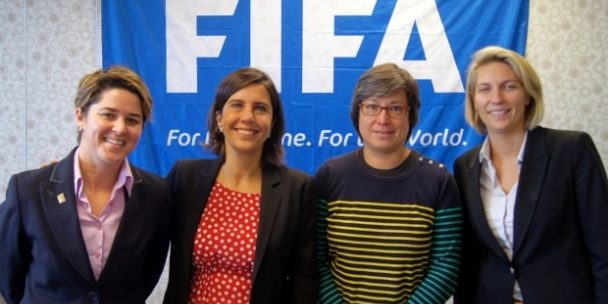FFA held the FIFA Women’s Football Administration Workshop with the support of FIFA across 21-22 September to discuss the management, administration, leadership and off field roles of females in Australian football.
Headed by FIFA Consultant Ebru Koksal, the workshop was attended by ten administrators from a number of Australia’s Member Federations, as well as four female coaches from the Female Coaches Mentor Program.
Koksal, who also sits on the Board of giant Turkish club Galatasaray, presented on ‘The Business of Sport’ and facilitated positive discussion among the attendees as she provided training in leadership development.
As well as delving into areas relevant to those in attendance, the topics in the workshop also touched on other parts of governance.
“It was an interesting mix of people from different backgrounds coming together – some coaches and some administrative people,” Koksal said.
“The first day was more about the business side of the game, about strategic planning, financial governance and marketing principles.
“It’s not the day to day responsibility of most of the people in the room but I think it’s important for them to see what the main functions are outside of their area of work.
Maybe now they have a broader understanding of the work that is being done in the bigger picture and in some cases it’s also an inspiration for them because they might aspire to change the course of their career and go into more of the business side of the game.”
“Either way I think it was very fruitful time.”
The workshop also comprised interesting insights from FIFA Executive Committee Member and former Matilda Moya Dodd, Capital Football CEO Heather Reid, and CFA CEO Morningstar Australasia Heather Brilliant into effective leadership and encouraging participants to strive to reach a high level in their chosen career paths of the game.
“These opportunities provide a great platform for some of our aspiring and promising female administrators and coaches in this country to hear and learn from some of the leading females in and outside of our industry,” said FFA Head of Women’s Football, Emma Highwood.
“FFA is looking to take a world lead in this space to ensure that some of our best female talent working in football are provided with the support they need to reach their full leadership potential.”
FFA’s efforts to provide support is reinforced by these administration workshops, which are a broader initiative from FIFA to motivate and educate the females working within federation associations.
“One of the most important principles (of these workshops) is participation at a high level in the administration and decision making of the business,” Koksal said.
“The more women that are involved will not only pull more women up into the echelons of the hierarchy, but also help with the women’s game to gain more visibility and more allocation of resources.
“These administration courses are aimed at creating more awareness among female employees in the football associations, showing them there is a clear career path they can follow in the business side of the game, and also sharpening up their leadership skills.
“So this is just a glimpse of what we can do to help them emerge as leaders.”
In her assessment of the current state of the game in Australia, Koksal believes FFA is ahead of many football associations in its progression in various areas including the increasing importance women’s football is gaining, to having dedicated people working towards and implementing a plan to continue striving to give women’s football the attention Koksal believes it deserves. So what are the next steps from here?
“Now it is about making these people work to bring in more resources and grow the game as part of the strategic plan,” Koksal added.







